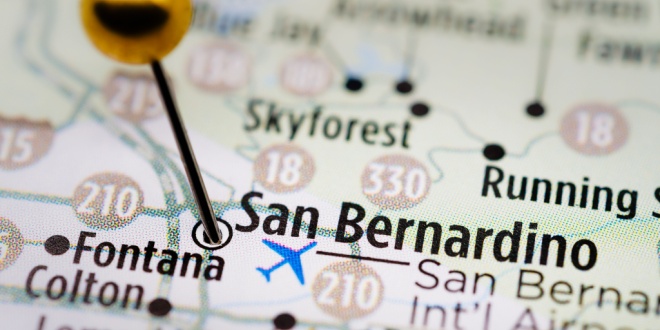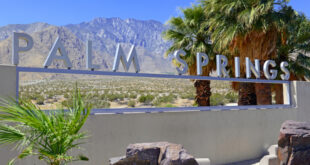The Carousel Mall in San Bernardino grabbed its share of headlines in 2024, as the city continued its efforts to redevelop the 43-acre downtown property next to Interstate 215.
Demolition of the mall was concluded in April, seven years after the property was abandoned and shut down for good.
At the same time, the project’s original developer – San Bernardino Development Co., a partnership of Renaissance Downtowns USA and ICO Real Estate Group – sued the city for breach of contract after San Bernardino terminated its agreement with the developer.
The city took that action after state officials accused San Bernardino of violating state laws when it began putting together its redevelopment plans, including submitting inaccurate documents to the State Department of Housing and Community Development.
San Bernardino also violated state law when it did not declare the former mall site surplus land, and it did not negotiate with two affordable housing developers who indicated they might be interested in developing residential units there.
Ultimately, the city paid the developer $100,000 and terminated the development agreement, a move the city undertook “unilaterally,” according to the lawsuit.
Meanwhile, San Bernardino continues to look for another developer to lead the project, which will be a combination of residential, retail, and office. The city council is expected to take up the matter in January, said Jeff Kraus city spokesman.
The Carousel Mall wasn’t the only downtown landmark in San Bernardino that made news in 2024.
In March, owners of the Harris Building at 300 N. E St. donated the three-story, 270,000-square-foot building to the city. The downtown structure was home to Harris’ department store for more than 80 years before it closed in 1999.
The city council has not decided what to do with the building, which has been vacant for 25 years. It could be restored in its present state, as a stand-alone building, or become part of the redevelopment of the Carousel Mall property next door, Kraus said.
In October, Ontario broke ground on the 190-acre Ontario Sports Empire complex, which will be built at the southeast corner of Vineyard Avenue and Riverside Drive south of the 60 Freeway.
The project’s centerpiece will be a 6,000-square-foot baseball stadium that will be home to a Single-A affiliate of the Los Angeles Dodgers.
The complex will also feature 13 multipurpose sports fields, eight softball/Little League Fields, and a park with a picnic area.
Other amenities will include a 160,000-square-foot indoors athletic facility with basketball and volleyball courts, batting cages, training rooms and a kitchen.
Also scheduled for development: a 70,000-square-foot community center, a 13,000-square-foot aquatic center, an outdoor skate park and tennis and pickle ball courts.
Ontario Sports Empire is expected to be completed in the fall of 2026. It will attract an estimated 1.2 million visitors a year, create about 700 jobs and pump approximately $70 million into the local economy, according to reports.
In September, Gov., Gavin Newsom signed AB 98, which places strict regulations regarding warehouse-distribution operations.
The new law, which will go into effect in 2026, sets guidelines for the location and design of those projects. It also places restrictions on parking, truck loading bays, landscaping buffers, entrance-exit gates, and signs.
The bill, which received strong opposition from the logistics industry, was introduced by Assemblywoman Eloise Gomez Reyes (D-San Bernardino) and, Assemblyman Juan Carillo (D-Palmdale). Both lawmakers said they want to make life safer for the people who live near logistics facilities, and who already deal with traffic, noise and less-than-healthy air.
AB 98 effectively puts Sacramento in charge of something that has long been left to cities and counties, a change that was responsible for much of the business community’s opposition to the bill.
AB 98’s passage is the result of a growing backlash against the logistics industry in some communities, especially in the Inland Empire.
One of those communities, Bloomington, won a rare victory in 2024, when it filed a lawsuit that blocked construction of a large industrial project, at least temporarily.
Bloomington Business Park would bring 2.1 million square feet of warehouse-distribution facilities to that unincorporated community of 23,000 residents near Fontana and Rialto.
But San Bernardino County Superior Court Judge Donald Alvarez put the project on hold. In a 100-page ruling issued in September, Alvarez declared that Bloomington Business Park, as planned, does not comply with the California Environmental Quality Act.
The developer, Howard Industrial Partners in Orange, has said it plans to correct the problems and will appeal the ruling.
Riverside also went court in 2024 in an attempt to block a major project: a proposed expansion of the UC Riverside campus.
A lawsuit filed in August in Riverside County Superior Court alleged that the UC Board of Regents did not address possible environmental issues in its 2021 Long Range Development Plan, which is the blueprint for the proposed expansion.
University officials say a larger campus is needed to handle an increase in enrollment from 26,000 students to 35,000 students during the next 10 to 15 years.
A larger campus would also help bring UC Riverside’s student-staff and student-faculty ratios in line with other UC schools, and it would help create more development on the university’s east end.
But that plan does not take into account potential negative impact on agricultural resources, greenhouse gas emissions and other environmental factors.
UC Riverside office have said they will proceed with their expansion plans.
Several Inland cities tried to bring their street vendors into line in 2024, a practice that has grown in popularity since the pandemic.
Fontana has made “significant progress” in making sure its street vendors follow all health and safety regulations that to apply food service, according to city officials.
That was after a $2,000 reimbursement program – the city was going to pay vendors to obtain business licenses and operate more like a brick-and-mortar businesses failed when no one took the city up on its offer.
In Victorville, the city council passed an ordinance establishing fines related to street vending. The regulations also make clear what items street vendors may or may not sell, and exactly where they can be sold.
Like Fontana, Victorville does not want to punish its street vendors, but rather wants them to operate more like regular businesses, according to officials in the High Desert city.
 IE Business Daily Business news for the Inland Empire.
IE Business Daily Business news for the Inland Empire.


